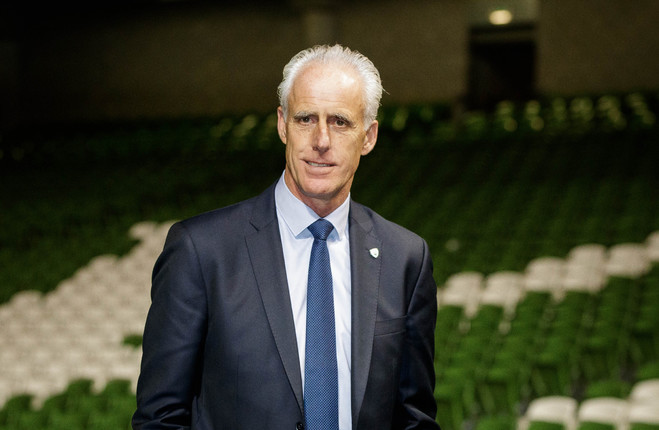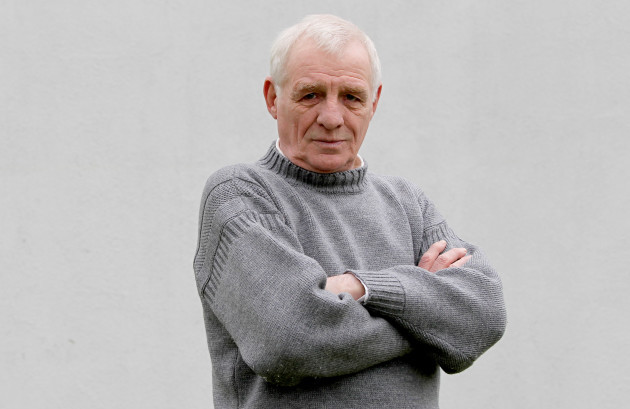Updated at 11.27
“COMEDY IS TRAGEDY plus time.” The quote has been attributed to a number of old comics and TV personalities, including Steve Allen, Bob Newhart and Carol Burnett among others.
The saying sprung to mind on Sunday in a location that has been distinctly short on laughs of late — the Aviva Stadium.
When the thorny issue of Saipan was raised for the umpteenth time at Mick McCarthy’s second unveiling as Ireland manager, the 59-year-old’s instinctive reaction was to start cracking up.
It was perhaps the perfect response to an incident that was distinctly devoid of humour at the time.
He then joked: “Why? What happened there [in Saipan]? My memory’s gone as well, the last 16 years.”
On a serious note, McCarthy said the issue was no longer worth discussing and it seems reasonable to assume the majority of the public would agree.
Whereas Roy Keane is someone who tends to hold onto grudges — the Alf-Inge Håland controversies and the recent chastising of Jon Walters over the pair’s clash at Ipswich eight years ago are prime examples — McCarthy convinces as an individual who is well capable of letting go.
Amid the jovial and relaxed atmosphere of Sunday’s re-introductory press conference — a stark contrast from the frequently morose vibe of outgoing manager Martin O’Neill’s somewhat terse media briefings — it is easy forget the scenes from the last time McCarthy managed an Irish team in Dublin and how it illustrated the fickle nature of the sporting public.
It was Ireland’s first home match since the World Cup. McCarthy, who also captained Ireland at Italy ’90 and was a key part of the side that excelled at Euro ’88, had previously overseen an Irish outfit getting to the tournament’s knockout stages, becoming only the second manager after Jack Charlton to achieve that feat.
In the 2002 competition, the Boys in Green had outplayed eventual finalists Germany and come within a penalty shootout of overcoming Spain and reaching the quarter finals. More than a decade has passed since then, with four successive managers trying and failing to inspire the team to the heights that McCarthy’s men enjoyed.
The Irish side returned home to great acclaim during those halcyon days and ordinarily, McCarthy would have been practically deified in the immediate aftermath. Yet the bitter acrimony over the Saipan fallout lingered and within two competitive games, the manager was gone. Having been a hero after overseeing a remarkable win over the Dutch before World Cup qualification was sealed following a tense two-legged play-off with Iran, McCarthy suddenly became the villain of the piece.
Euro 2004 qualification started badly with a 4-2 defeat away to Russia and got worse from there. A 2-1 home loss to Switzerland was another serious setback. Worse still was the crowd’s reaction. Roy Keane’s name was loudly chanted by supporters towards the end of the match and his rival appeared doomed. It was clear which side of the divide the majority of those in attendance fell on during that fateful night in Lansdowne Road.
The suspicion was that McCarthy’s exit would pave the way for Keane’s return and so it proved, as the FAI parted company with the Barnsley native less than five months on from the heroics in Korea and Japan, with the then-Manchester United captain coming back to the senior side during Brian Kerr’s reign as manager.
In hindsight, McCarthy stood little chance once results started to turn sour. What followed was effectively a popularity contest, in which there was only going to be one winner. It pitted an embattled manager against one of the country’s most famous and talented sporting figures, who was at the peak of his powers, while possessing a rebellious streak and anti-authoritarian stance that endeared him to many fans and journalists.
Yet the tide of public opinion has altered drastically in the 16 intervening years. McCarthy could afford to smile on Sunday, as his reputation has undoubtedly grown during that time — owing to the by-and-large excellent jobs he performed at Sunderland, Wolves and Ipswich — whereas Keane’s standing has arguably diminished.
The evolution in McCarthy’s image is perhaps epitomised by how Eamon Dunphy has revised his opinion on him over the years. During the Saipan fallout, the former RTÉ pundit was the manager’s most ardent critic, but since then, his views have softened to the extent where once, he seemed to look on the former defender as the perfect representation of all the ills and inadequacies that existed in Irish football, he has more recently been leading the calls for the ex-Celtic and Man City star to succeed O’Neill as manager.
The Man United legend, on the other hand, was a great player, but he has yet to prove himself as a top coach. Since Saipan, Keane has been involved in several other high-profile fallouts, with Walters, Harry Arter and Alex Ferguson among others. These misanthropic tendencies have subsequently led credence to suggestions that he is plainly ill-suited to managing players at the highest level.
McCarthy, by contrast, has gained a reputation as a solid coach skilled in the art of helping ordinary teams to punch above their weight significantly. He is also one of the most well-liked figures in football. Whereas often, there is a nastiness to those who thrive in management — characters such as Jose Mourinho tend to behave poorly at times — McCarthy is one obvious exception to the rule. Ask anyone who played under him what he was like and they invariably have nothing but good things to say.
“It doesn’t matter who [else] you have, it doesn’t matter the quality of the player. If you have Mick McCarthy, TC [Terry Connor], people like [Ipswich stars] Luke Chambers, Cole Skuse, and you put in 15 average players, they will do okay for you. They will not be relegated. They will hold their own, and overachieve, because of the people that are involved.”
McCarthy’s stock in Ireland has also risen considerably of late. Back in 2013, when the Boys in Green were searching for Giovanni Trapattoni’s successor, a poll run by this website asking for the preferred choice as the next Ireland manager had McCarthy as the runaway winner in the voting.
Given the sudden and, many would argue, unfair end to his tenure last time around, with McCarthy and Ireland, there is a distinct sense of unfinished business.
Although he is unlikely to admit it publicly, somewhere in McCarthy, there is surely a burning desire to put right the wrongs of the past.
“I was never going to turn down the chance to take the job,” he said on Sunday, and you got the sense he really meant it.
Leading out his country in Dublin as manager at the 2020 European Championships, rather than being booed off the field against the Swiss by an unforgiving public, would be the perfect ending to a bittersweet romance that the 57-times-capped international, this giant figure in Irish football, unquestionably deserves.
Subscribe to our new podcast, Heineken Rugby Weekly on The42, here:


